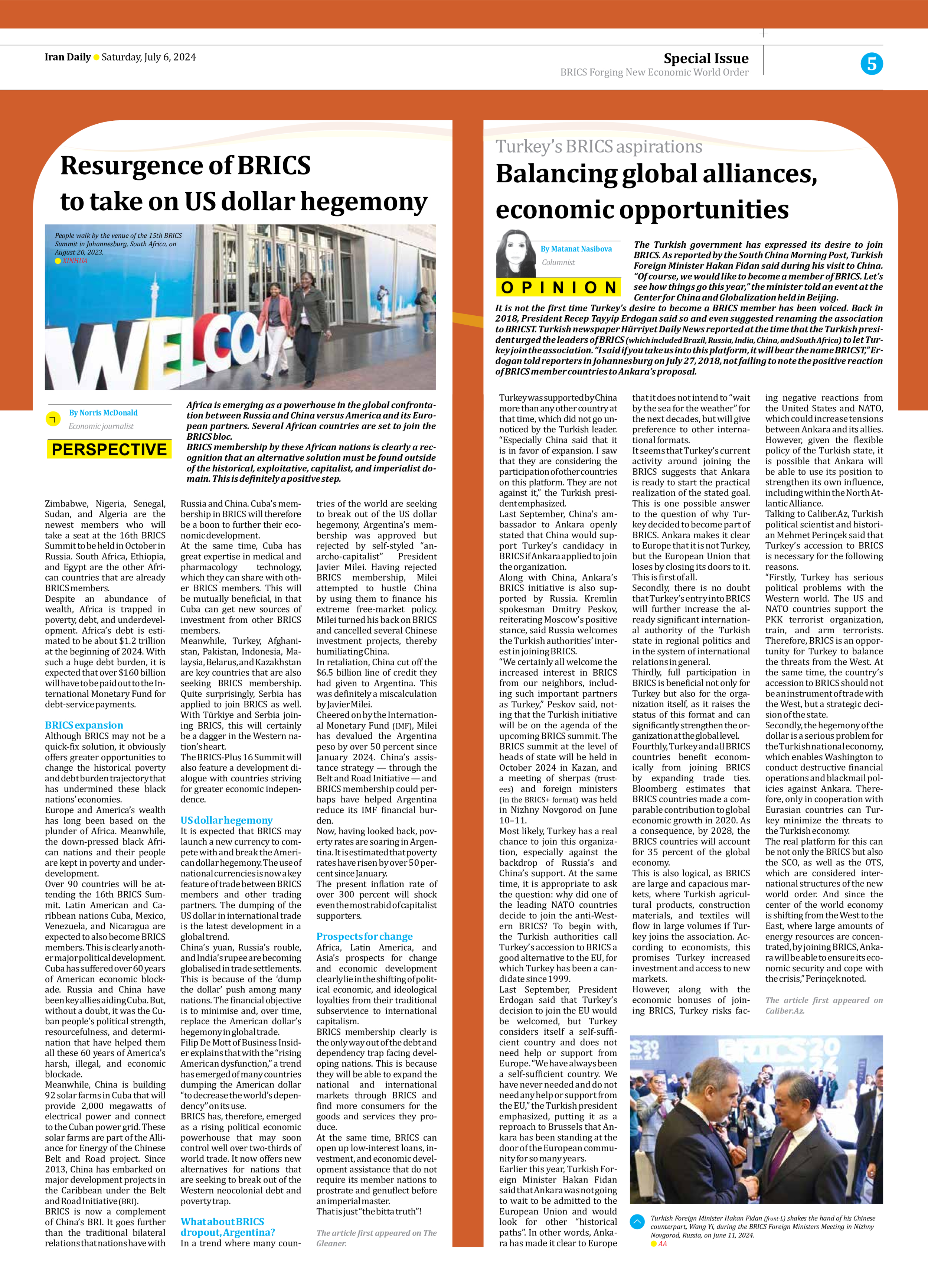
Resurgence of BRICS to take on US dollar hegemony
Africa is emerging as a powerhouse in the global confrontation between Russia and China versus America and its European partners. Several African countries are set to join the BRICS bloc. BRICS membership by these African nations is clearly a recognition that an alternative solution must be found outside of the historical, exploitative, capitalist, and imperialist domain. This is definitely a positive step.
By Norris McDonald
Economic journalist
Zimbabwe, Nigeria, Senegal, Sudan, and Algeria are the newest members who will take a seat at the 16th BRICS Summit to be held in October in Russia. South Africa, Ethiopia, and Egypt are the other African countries that are already BRICS members.
Despite an abundance of wealth, Africa is trapped in poverty, debt, and underdevelopment. Africa’s debt is estimated to be about $1.2 trillion at the beginning of 2024. With such a huge debt burden, it is expected that over $160 billion will have to be paid out to the International Monetary Fund for debt-service payments.
BRICS expansion
Although BRICS may not be a quick-fix solution, it obviously offers greater opportunities to change the historical poverty and debt burden trajectory that has undermined these black nations’ economies.
Europe and America’s wealth has long been based on the plunder of Africa. Meanwhile, the down-pressed black African nations and their people are kept in poverty and underdevelopment.
Over 90 countries will be attending the 16th BRICS Summit. Latin American and Caribbean nations Cuba, Mexico, Venezuela, and Nicaragua are expected to also become BRICS members. This is clearly another major political development.
Cuba has suffered over 60 years of American economic blockade. Russia and China have been key allies aiding Cuba. But, without a doubt, it was the Cuban people’s political strength, resourcefulness, and determination that have helped them all these 60 years of America’s harsh, illegal, and economic blockade.
Meanwhile, China is building 92 solar farms in Cuba that will provide 2,000 megawatts of electrical power and connect to the Cuban power grid. These solar farms are part of the Alliance for Energy of the Chinese Belt and Road project. Since 2013, China has embarked on major development projects in the Caribbean under the Belt and Road Initiative (BRI).
BRICS is now a complement of China’s BRI. It goes further than the traditional bilateral relations that nations have with Russia and China. Cuba’s membership in BRICS will therefore be a boon to further their economic development.
At the same time, Cuba has great expertise in medical and pharmacology technology, which they can share with other BRICS members. This will be mutually beneficial, in that Cuba can get new sources of investment from other BRICS members.
Meanwhile, Turkey, Afghanistan, Pakistan, Indonesia, Malaysia, Belarus, and Kazakhstan are key countries that are also seeking BRICS membership. Quite surprisingly, Serbia has applied to join BRICS as well. With Türkiye and Serbia joining BRICS, this will certainly be a dagger in the Western nation’s heart.
The BRICS-Plus 16 Summit will also feature a development dialogue with countries striving for greater economic independence.
US dollar hegemony
It is expected that BRICS may launch a new currency to compete with and break the American dollar hegemony. The use of national currencies is now a key feature of trade between BRICS members and other trading partners. The dumping of the US dollar in international trade is the latest development in a global trend.
China’s yuan, Russia’s rouble, and India’s rupee are becoming globalised in trade settlements. This is because of the ‘dump the dollar’ push among many nations. The financial objective is to minimise and, over time, replace the American dollar’s hegemony in global trade.
Filip De Mott of Business Insider explains that with the “rising American dysfunction,” a trend has emerged of many countries dumping the American dollar “to decrease the world’s dependency” on its use.
BRICS has, therefore, emerged as a rising political economic powerhouse that may soon control well over two-thirds of world trade. It now offers new alternatives for nations that are seeking to break out of the Western neocolonial debt and poverty trap.
What about BRICS
dropout, Argentina?
In a trend where many countries of the world are seeking to break out of the US dollar hegemony, Argentina’s membership was approved but rejected by self-styled “anarcho-capitalist” President Javier Milei. Having rejected BRICS membership, Milei attempted to hustle China by using them to finance his extreme free-market policy. Milei turned his back on BRICS and cancelled several Chinese investment projects, thereby humiliating China.
In retaliation, China cut off the $6.5 billion line of credit they had given to Argentina. This was definitely a miscalculation by Javier Milei.
Cheered on by the International Monetary Fund (IMF), Milei has devalued the Argentina peso by over 50 percent since January 2024. China’s assistance strategy — through the Belt and Road Initiative — and BRICS membership could perhaps have helped Argentina reduce its IMF financial burden.
Now, having looked back, poverty rates are soaring in Argentina. It is estimated that poverty rates have risen by over 50 percent since January.
The present inflation rate of over 300 percent will shock even the most rabid of capitalist supporters.
Prospects for change
Africa, Latin America, and Asia’s prospects for change and economic development clearly lie in the shifting of political economic, and ideological loyalties from their traditional subservience to international capitalism.
BRICS membership clearly is the only way out of the debt and dependency trap facing developing nations. This is because they will be able to expand the national and international markets through BRICS and find more consumers for the goods and services they produce.
At the same time, BRICS can open up low-interest loans, investment, and economic development assistance that do not require its member nations to prostrate and genuflect before an imperial master.
That is just “the bitta truth”!
The article first appeared on The Gleaner.







